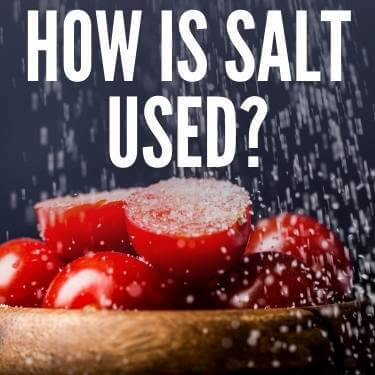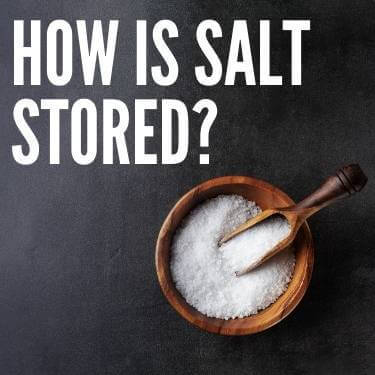If you’re buying or selling salt, especially in large quantities, it is important to know the ins and outs of shipping this precious commodity. From food grade to rock salt for roadways, there is a lot that goes into salt shipping.
Challenges involved with salt shipping include avoiding moisture and contaminants, odor, and shrinkage. Salt must be shipped in a container that is clean and dry. Additionally, bags and pallets of salt can not be shipped in containers with any other commodities that might emit moisture. You can overcome these challenges by shipping salt with a strategic partner.

Salt is a precious commodity. In most cases, salt comes from salt mines. Salt can also come from seawater. Annual global salt production added up to 293 million metric tons in 2019. Most salt is produced in China.
Salt isn't the only mined commodity we can help you ship. Learn about the iron ore transportation process.
Salt has more applications and uses than you might be aware of. Of course, it is often used as a food flavoring and additive, but did you know most applications of salt involve industry and manufacturing? A lot of salt is used in water conditioning and as ice melt on the nation’s streets and highways, too.
Are you shipping spices to flavor food? Wondering how are spices transported? Learn more with our expert advice.
In fact, only 6% of all the world’s manufactured salt is used in food products. The other 94% is used for industrial purposes and more. Let’s breakdown how salt is used:
There are many ways salt is used in manufacturing and industry. Salt is important to chemical production and is used to make chemicals like caustic soda and chlorine. Additionally, salt is used in the production of paper and pulp, PVC, plastics, and more.
With so many diverse applications, it’s easy to see why salt is often shipped in bulk. Shipping salt in bulk is especially important in the fall, as many municipalities and state highway and transportation departments are stocking up on rock salt to use as ice melt on roadways.
Most shippers rely on two methods to move salt in bulk. Salt can be bagged and palletized for shipment or salt can be shipped by the to in a truck or dry van. The method you choose to ship salt depends on the kind of salt and the application of the salt.
Regardless of whether the salt is in bags or loose, precautions must be taken when shipping salt. Salt needs to be shipped in a clean, dry van. This is because exposing bulk salt to any moisture and potential contaminants during the shipping process can damage the valuable commodity. Additionally, it’s a good idea to use a fitted inner liner when shipping salt in bulk, too. This kind of lining will further protect the salt from moisture and impurities.
Why is avoiding moisture so important when shipping salt in bulk? When salt comes into contact with water or even water vapor, lumps can form in the salt. Lumps are bad news because they can prevent the salt from being pourable, which means the salt can’t be used for it’s intended purposes and it loses value.
Another challenged that can come with shipping salt in bulk is that it can be corrosive. In fact, salt can corrode steel. This is why using an inner liner is important and all van cracks and opens need to be sealed. If you are using breakbulk shipping to move salt in a container, it is recommended that the container housing the salt be covered with at least two coats of whitewash before the shipment is loaded. This will protect the carrier’s assets and will ensure the integrity of your salt shipment.

Salt can be stored in warehouses and other kinds of facilities. If you’re storing table salt in bulk or in bags, it is important that you use a warehousing partner with food-grade certifications. Salt used for water conditioning and industrial uses might not have the same requirements. Rock salt for ice melt on roads and highways might be stored in domes and silos before use.
If all the right precautions are taken when storing and shipping salt, it might last for several years. Just like when shipping, it is important that salt is stored in a dry environment. It is also important that salt is kept away from metals, as it can be corrosive to steel. Additionally, salt must be kept away from contaminants that can damage the product’s integrity.
Another thing to keep in mind when storing salt is potential volume loss. Salt can lose volume and weight due to evaporation. While keeping the salt dry can lesson shrinkage, it is still a risk.
There are a few risks that go into salt shipping. As you read above, salt is corrosive to steel. This means precautions must be taken to ensure shipping containers and vans stay dry we shipping salt.
Additionally, rust can form when salt and iron meet. This means the metal and salt should be separated. Not only can rust stain the salt, it can also lessen the metal’s strength and corrode the material.
Salt can also absorb odors during shipping and storage. This is an especially important consideration when shipping salt for food. Other risk factors associated with salt shipping include moisture exposure, vulnerability to contamination, toxicity, and shrinkage.
The right shipping and storage partner is prepared to mitigate and find solutions for the risks associated with moving salt. See how a strategic partner can handle your shipment with ease and make salt shipping easy.
Salt is a valuable commodity and requires the right handling for shipment. You’ll find that R+L Global Logistics has the right touch and is able to take care of all of your business’s salt shipping needs. From avoiding loss due to shrinkage to ensuring dry shipping and storing along the way, we’re here to help every mile of the journey.
You’ll also find that R+L Global Logistics has the truckload capacity needed to move your shipment. Our friendly agents will provide an inclusive shipping costs quote in just minutes -- no need to wait business days for a quote like with other carriers. Our diverse services include everything from strong hazmat carriers to heavy haul trucking, which means we’re ready to move no matter the commodity.
Read to make salt shipping simple? Reach out now for a hassle-free, no-pressure truckload freight quote.
R+L Global Logistics
315 NE 14th St., Ocala, FL 34470